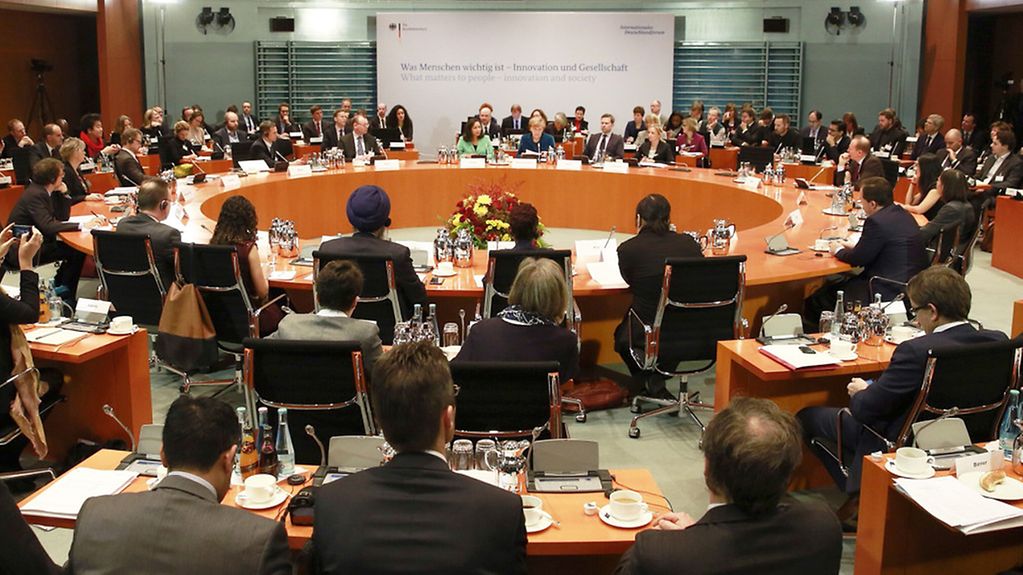Second International German Forum
Chancellor Angela Merkel has called for a readiness to accept new ideas in efforts to resolve problems. Germany too must look and see what ideas and what innovations other use to tackle major challenges, she stressed. The focus was on innovations for wellbeing, prosperity and progress.
4 min reading time

Platform for a network - the Second International German Forum
Photo: Bundesregierung/Kugler
It is very encouraging, said Angela Merkel, that Germany is able to address challenges such as the coexistence of poor and rich, conflicts between employers and trade unions and debates about environmental protection in a positive and peaceful way, in its capacity as a highly developed society. Nevertheless, Germany like other developed nations can also learn from others and should review its own capacity for innovation at regular intervals. Key issues quoted by the Chancellor included climate change mitigation, peace and the sustainable management of natural resources. These are issues that are also discussed at G7 level. Germany currently holds the G7 Presidency.
How do others address challenges, which are often the same challenges? This was the question at the heart of the Second International German Forum. Experts from around the world discussed innovations for wellbeing, prosperity and progress. With this second Forum, the Chancellor offered some 120 German and international experts, who together represented the academic community, the private sector, politics and civil society in 30 countries, a platform for dialogue on relevant issues that will shape our future.
Mutual understanding and tolerance
Angela Merkel urged that global networking should be designed so as to be a genuine benefit. This presupposes a greater cultural understanding of the different regions of the world, she said. It is important to delve into the historical contexts. And this in turn presuppose a more "Humboldtian approach" which values a broad education that can enable us to understand the world. Tolerance and mutual respect are also important. "Tolerance is a great virtue, and one that we probably have to learn in the way we deal with one another in society," said Angela Merkel.
The Chancellor stressed the great importance of civil societies. Binding agreements at government level are important, but if problems are really to be resolved, civil society must be involved, she stated with conviction.
Chancellor’s and German government’s dialogue with citizens
The entire question of the capacity for innovation is not limited to technology, in the view of the Chancellor. Social and societal innovations are also important. In these fields it is crucial that we talk to one another and that we listen to one another. One innovation that has the support of the entire German government is the dialogue with citizens entitled "Living well in Germany". Over the next few months the people of Germany will be asked what matters to them. The dialogue will focus on quality of life. Here too it is important to learn from one another.
Learning from one another
John Kao, Chair of the San Francisco-based Institute for Large Scale Innovation, called for a common understanding of innovation. It is important to devise a story and a strategy for innovations that can kindle the enthusiasm of citizens. He urged that governments invest in education and support young people around the world so that they can become hands-on innovators and contribute to societal change.
Juliana Rotich from Kenya reported on her non-profit technology business Ushahidi, which develops free open source software, as well as hardware including an internet modem which ensures a secure power supply and maintains internet access in spite of frequent power cuts.
Suneet Singh Tuli, the founder, president and CEO of DataWind, set himself the goal of giving the world’s poorest three billion people access to digital technology, helping improve their lives. He sells basic tablet PCs for about 35 US dollars. The Indian entrepreneur says that internet access is a "human right".
The matter closest to Alessandra Orofino’s heart is local networking of citizens to strengthen the community and to give citizens a say in shaping politics and policies. She is managing director and co-founder of Meu Rio, an online platform which develops instruments for civic engagement and citizen participation in Brazil. Her online platform in Rio has more than 200,000 members.
Geoff Mulgan from the United Kingdom focused on "social innovation". His foundation, Nesta, promotes innovative ideas to enhance the quality of life in society. Scientific findings should be translated into prosperity and more cash and ideas invested in non-profit purposes, he says.
Building a network for global learning
The Chancellor praised the numerous initiatives and projects. She advocated founding a "network for global learning". Digitalisation could be an opportunity, but it is only a means to an end – a way of picking people up and bringing them together.